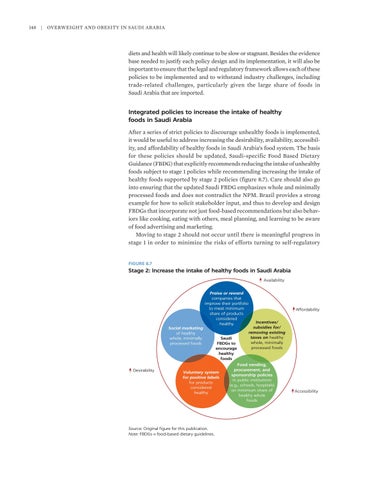148
|
Overweight and Obesity in Saudi Arabia
diets and health will likely continue to be slow or stagnant. Besides the evidence base needed to justify each policy design and its implementation, it will also be important to ensure that the legal and regulatory framework allows each of these policies to be implemented and to withstand industry challenges, including trade-related challenges, particularly given the large share of foods in Saudi Arabia that are imported.
Integrated policies to increase the intake of healthy foods in Saudi Arabia After a series of strict policies to discourage unhealthy foods is implemented, it would be useful to address increasing the desirability, availability, accessibility, and affordability of healthy foods in Saudi Arabia’s food system. The basis for these policies should be updated, Saudi-specific Food Based Dietary Guidance (FBDG) that explicitly recommends reducing the intake of unhealthy foods subject to stage 1 policies while recommending increasing the intake of healthy foods supported by stage 2 policies (figure 8.7). Care should also go into ensuring that the updated Saudi FBDG emphasizes whole and minimally processed foods and does not contradict the NPM. Brazil provides a strong example for how to solicit stakeholder input, and thus to develop and design FBDGs that incorporate not just food-based recommendations but also behaviors like cooking, eating with others, meal planning, and learning to be aware of food advertising and marketing. Moving to stage 2 should not occur until there is meaningful progress in stage 1 in order to minimize the risks of efforts turning to self-regulatory
FIGURE 8.7
Stage 2: Increase the intake of healthy foods in Saudi Arabia Availability
Social marketing of healthy whole, minimally processed foods
Desirability
Praise or reward companies that improve their portfolio to meet minimum share of products considered healthy Saudi FBDGs to encourage healthy foods
Voluntary system for positive labels for products considered healthy
Source: Original figure for this publication. Note: FBDGs = food-based dietary guidelines.
Affordability Incentives/ subsidies for/ removing existing taxes on healthy whole, minimally processed foods
Food vending, procurement, and sponsorship policies in public institutions (e.g., schools, hospitals) on minimum share of healthy whole foods
Accessibility






